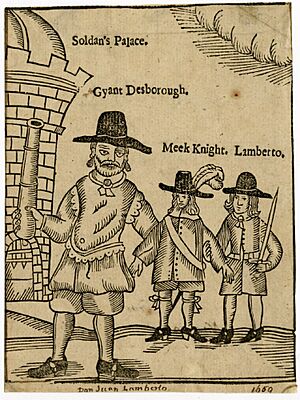John Desborough facts for kids
Quick facts for kids
John Desborough
|
|
|---|---|
| Born | 1608 |
| Died | 1680 |
| Allegiance | Parliamentary cause |
| Rank | Major |
| Battles/wars | English Civil War |
| Other work | Politician |
John Desborough (1608–1680) was an English soldier and politician. He was an important figure who supported the Parliament during the English Civil War. He was also the brother-in-law of Oliver Cromwell, a very powerful leader of that time.
Contents
Early Life and Family
John Desborough was born in 1608. His parents were James Desborough and Elizabeth Hatley. He was baptized on November 13, 1608. He studied law, which is about rules and justice.
In 1636, he married Jane Cromwell. She was the sister of Oliver Cromwell, who later became the Lord Protector of England. This marriage connected him to one of the most important families in England during this period.
A Soldier in the Civil War
John Desborough was a skilled soldier. He played a big part in the English Civil War. This war was fought between those who supported the King and those who supported Parliament.
- In 1645, he was a major. He fought in battles like Langport and Hambleton Hill.
- He also led cavalry (soldiers on horseback) during the Storming of Bristol.
- Later, he helped with military actions around Oxford.
- By 1648, he was a colonel. He commanded forces in Great Yarmouth.
He did not take part in the trial of King Charles I in 1649. Instead, he was busy helping to bring order to the west of England. He fought as a major-general at the Battle of Worcester. He almost captured Charles II, the King's son, near Salisbury.
Political Career
After the war, England became a Commonwealth. This meant it was a republic, not ruled by a king. John Desborough became an important politician:
- In 1652, he joined a group working on legal reforms.
- In 1653, he became part of the Protectorate council of state. This was a powerful government group.
- He also became a commissioner for the treasury, managing government money.
- He was made one of the four Generals at Sea, leading the navy.
- In 1654, he became the constable of St Briavel's Castle.
- From 1655 to 1656, he was a major-general in charge of the southwest of England.
He was chosen to be a member of Parliament several times:
- In 1653, for the Barebones Parliament.
- In 1654, for the First Protectorate Parliament representing Cambridgeshire.
- In 1656, for the Second Protectorate Parliament representing Somerset.
In the Second Parliament, he suggested a "Militia Bill." This bill would have helped pay for the army by taxing Royalists (people who supported the King). However, the bill was not passed.
In 1657, he joined the Protector's Privy Council. This was a group of close advisors to Oliver Cromwell. In 1658, he also took a seat in Cromwell's Other House, which was like a House of Lords.
After Cromwell's Death
Even though he was related to Oliver Cromwell, John Desborough strongly disagreed when Cromwell considered becoming king. After Oliver Cromwell died, John Desborough did not support his nephew, Richard Cromwell, who became the new Lord Protector.
Instead, Desborough and Charles Fleetwood encouraged the army to oppose Richard Cromwell. They even forced Richard to dissolve his Parliament in 1659.
Desborough was then chosen for the new Council of State. He became a colonel and governor of Plymouth. However, he and other officers presented a petition from the army that caused trouble. Because of this, he was dismissed from his roles.
The new military government did not last long. Desborough lost his influence, and his own soldiers even turned against him. When the Parliament returned, he was told to leave London.
Later Years and Legacy
When the King returned to power in 1660 (the Restoration), John Desborough was not punished with death or loss of property. However, he was not allowed to hold public office anymore.
He was later arrested because he was suspected of plotting against the King. But he was soon released. He then went to the Netherlands, where he continued to be involved in republican ideas (wanting a government without a king).
In 1666, he was ordered to return to England. He was put in the Tower of London until 1667, when he was questioned and set free.
John Desborough died in 1680. He had one daughter and seven sons with his first wife, Jane Cromwell. He married a second time in 1658, but her name is not known.
Desborough was a good soldier, but he believed that government should be run by force and the army. People who supported the King often made fun of his rough manners in songs and writings. He was even made fun of in a famous poem called Hudibras by Samuel Butler.
 | James B. Knighten |
 | Azellia White |
 | Willa Brown |


